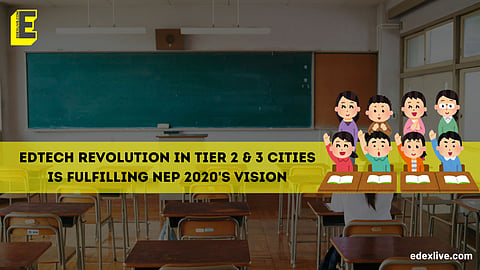EdTech revolution in Tier 2 & 3 cities is fulfilling NEP 2020's Vision
For generations, learners across India have aspired to crack competitive exams like Joint Entrance Examination (JEE) and National Eligibility cum Entrance Test (NEET), often uprooting themselves from their hometowns to migrate to coaching hubs in metropolitan cities. While some success stories from these coaching centers are celebrated, the reality for many learners is far more challenging, academic pressure, financial strain, and being away from the comfort of home.
This centralised approach to education has long created barriers to equitable learning opportunities. However, a transformation is underway.
The EdTech revolution is redefining access to quality education, bringing the vision of the National Education Policy (NEP) 2020 to life in Tier 2 and 3 cities.
Decentralising education with EdTech
Take Patna and Varanasi, for instance, cities that were once considered secondary to the elite educational hubs but are now producing top JEE and NEET rankers. This shift is fueled by EdTech platforms that are making high-quality education accessible at the local level.
According to a recent study - Impact Study of EdTech in India: Driving Innovations & Creating Opportunities, 69% of parents and nearly all teachers acknowledge that technology-driven learning has opened new doors for learners, even in remote areas. With 954 million internet subscribers and widespread smartphone penetration, the traditional urban-rural divide in education is rapidly closing.
The same study highlights that half of all high school learners now spend over five hours daily on online learning platforms. They engage in live classes, AI-driven assessments, and interactive problem-solving sessions - tools that ensure personalized learning experiences.
This shift is not just about convenience; it’s about empowering learners with resources that were once available only to those in major cities.
Hyper-personalised learning: The future of education
One of the biggest concerns for parents has always been: “Baccha seekha ki nahi?” EdTech is addressing this fundamental doubt through AI-powered, hyper-personalised learning solutions. By tracking individual progress, identifying knowledge gaps, and providing targeted interventions, AI-driven systems ensure that learners grasp concepts effectively.
From foundational learning to advanced problem-solving, EdTech is revolutionizing the way learners prepare for competitive exams. Generative AI models are now enhancing personalisation, making learning not just accessible but also adaptive to each learner’s unique pace and needs.
Economic impact: More than just learning
Beyond its impact on learners, EdTech is also reshaping the economics of education. The hybrid learning model is making quality education more affordable while simultaneously creating employment opportunities. Teachers in smaller cities, who previously struggled with job stability, are now earning six-figure salaries.
This financial transformation is not only uplifting educators but also contributing to India’s GDP, with the EdTech sector projected to reach $29 billion by 2030.
For families, this shift means reduced financial and emotional burdens. Parents no longer need to invest in expensive relocations for their children’s education. Instead, they can access premier coaching and learning resources right at home, ensuring that academic excellence is not limited by geography.
The road ahead: Scaling EdTech for maximum impact
The future of education lies in seamless hybrid models that blend technology with human connection. Mobile-first architectures, AI-driven learning ecosystems, and microservices-based platforms are making anytime, anywhere learning a reality. But to unlock EdTech’s full potential, policy support is crucial.
Reducing GST on educational services from 18% to 5% would make digital learning more affordable. Additionally, formalizing hybrid learning through public-private partnerships can further mainstream EdTech solutions across the country.
The real challenge now is not whether EdTech can democratize education - it already is. The question is, how quickly can we scale its impact to empower every learner across India? The success of EdTech will not be measured by exam scores alone but by its ability to create lifelong learners, learners who can think critically, solve complex problems, and adapt to an evolving world. As we align EdTech with NEP 2020’s vision, we’re not just digitizing education; we’re revolutionizing the way the next generation learns, thinks, and grows.
(Ujjwal Singh is the Founding CEO of Infinity Learn by Sri Chaitanya. Views expressed are his own.)


